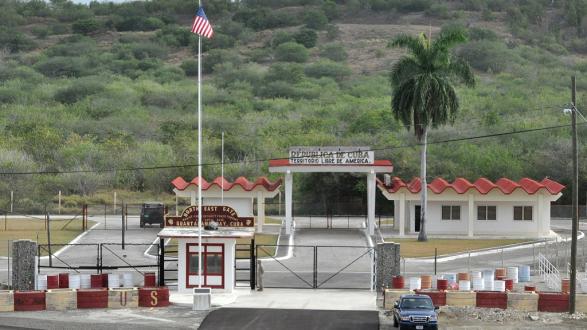Most of the 41 terror suspects who remain confined at Guantánamo Bay are unlikely to be released from custody any time soon, but the possibility that new detainees may soon be sent to the facility argues for early action to accelerate the legal proceedings against those already being held.
Some of the detainees have been incarcerated for more than 15 years without a trial. The delays stem from inefficiencies in the U.S. military judicial process and the complexity of the cases themselves.
But what if U.S. federal judges, rather than the military, ran the process? As we noted in our 2016 report Up to Speed, the trials could be more efficiently—and likely more cost effectively—managed by handing them over to federal judges.
Assigning federal judges full-time to Guantánamo would surely improve on the record of the military tribunals, which conducted only 30 days of on-the-record trial activity—across more than 100 defendants confined there at that time—during 2015.
If the prison is to remain open, the processes conducted there should be streamlined, and the facility itself should be modernized to hasten the dispensation of justice.
A variety of factors contribute to the slow pace of the trials under the military, but much of it simply comes down to logistics. None of the key personnel, including judges and prosecution teams, are based on the island.
With no full-time personnel dedicated to the trials, assembling all the parties on a Caribbean island—reached by a three-hour military charter flight from Andrews Air Force Base in Maryland—is itself a trial at times. Legal teams, including the military judges, occasionally spend as much time in transit as they do participating in courtroom proceedings.
Note that we are not suggesting that the prisoners be moved to more geographically convenient facilities in the United States. We are neutral on whether the Guantánamo facility itself should be closed. But if it is to remain open, the processes conducted there should be streamlined, and the facility itself should be modernized to hasten the dispensation of justice.
Why is reinvigorating the process and modernizing the court facilities important now, especially with such a small number of defendants remaining? Because the Trump administration is considering admitting new detainees to Guantánamo.
The original sources of Guantánamo detainees were the battlefields in Afghanistan and Iraq, as well as individuals captured elsewhere across the globe that were suspected of supporting al Qaeda.
Reform could give detainees their long-denied day in court and possibly help deliver judicial closure to the families of terror victims.
But Afghanistan and Iraq now run the judicial process for detainees captured on their own territory. Instead, future detainees are likely to come from Syria and the conflict with ISIL.
Recently, some in the Trump administration argued that two captured Islamic State militants—El Shafee Elsheikh and Alexanda Kotey, who belonged to a cell that held, tortured, and killed Western hostages—should be transferred to Guantánamo.
Others have suggested they should be tried in federal court in the mainland United States. While no decision has been made, the debate over these two prisoners presents the possibility that the prison population at Guantánamo could rise again.
Thus, the time for improving trial capacity and efficiency is now, before new prisoners are added to a population. Reform could give detainees their long-denied day in court and possibly help deliver judicial closure to the families of terror victims.
_______________________
Jack Riley is a Pacific Council member and vice president and director of the nonprofit, nonpartisan RAND Corporation’s National Security Research Division.
Michelle Marie Kezirian is a Pacific Council member, solo practitioner, and co-chair of the Pacific Council’s Guantánamo Bay Observer Program.
Richard B. Goetz is a Pacific Council Director, partner at O’Melveny & Myers LLP, and co-chair of the Pacific Council’s Guantánamo Bay Task Force.
Jerrold D. Green is president and CEO of the Pacific Council on International Policy.
This op-ed was originally published in The Hill.




